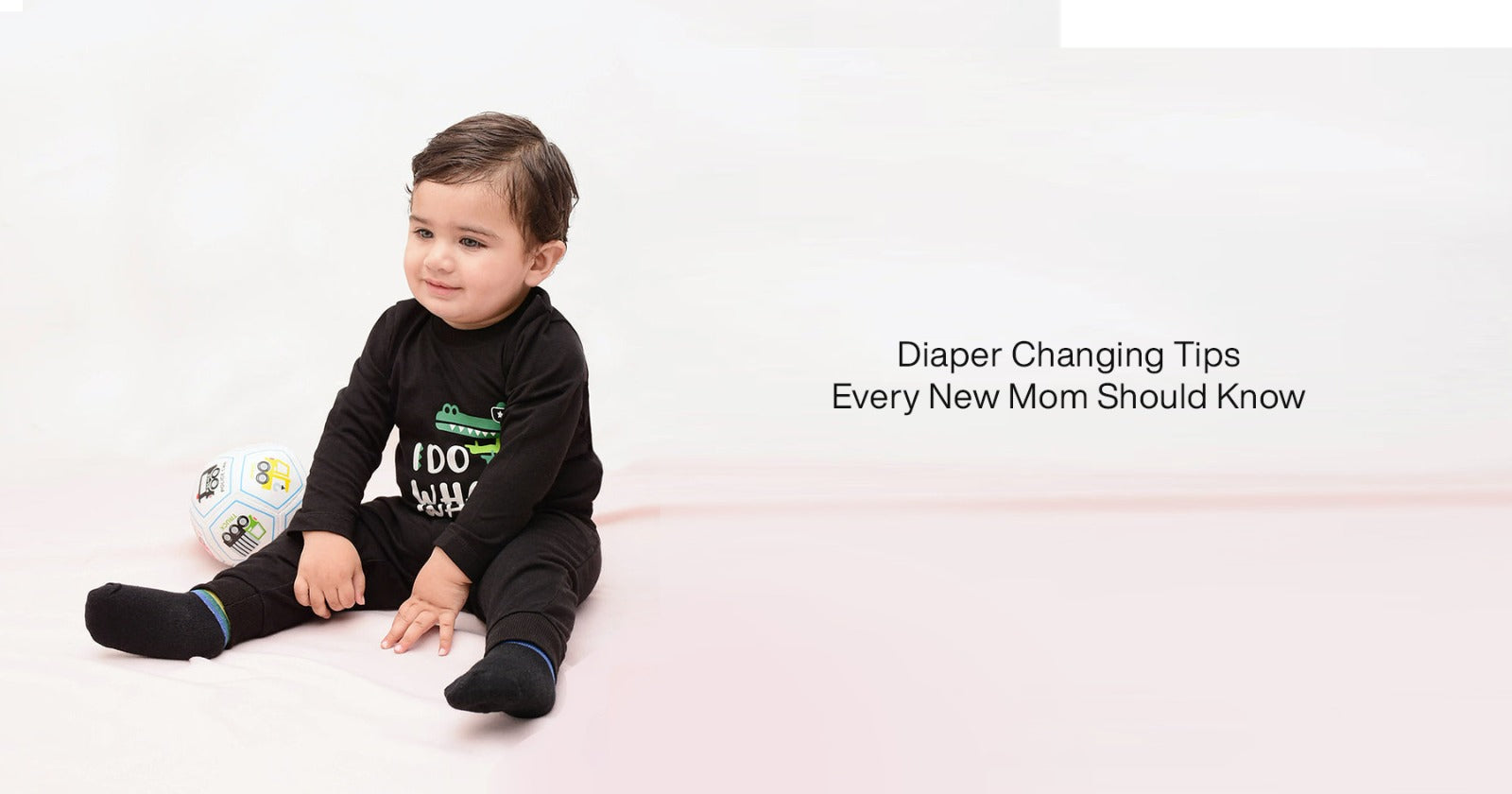Changing diapers might be an unfamiliar activity for new mothers, but it is a crucial component of baby care. While diaper changes may appear frightening at first, with the appropriate attitude and skills, they can be a quick and easy process. Furthermore, selecting the appropriate newborn baby clothing can improve your baby's comfort during diaper changes and throughout the day. In this blog, we will discuss diaper-changing strategies that every new mum should know to keep their baby comfortable and happy.
1. Prepare Your Diaper Changing Station
A well-organized diaper changing station is essential for effective diaper changes. Maintain easy access to all necessary items, such as:
- Clean diapers (disposable or cloth)
- Baby wipes or a damp washcloth
- Diaper rash cream or ointment
- A clean changing mat or pad
- A fresh set of clothes, such as soft newborn baby clothes
Having everything ready ahead of time allows you to focus on your kid without interruptions. Additionally, utilising breathable and easy-to-change garments, such as those from Cuddle & Cradle, can make the procedure easier.
2. Practice Hygiene
Before you touch your infant, carefully wash your hands. If soap and water are not available, apply hand sanitizer. Keeping your hands clean lowers the chance of transferring germs to your infant.
After removing the dirty diaper, clean the baby's bottom with baby wipes or a moist towel. To avoid infections, always wipe from front to back, especially with infant females.
3. Use the Right Size Diaper
The proper diaper size is crucial for your baby's comfort and to prevent leakage. A diaper that is overly tight will irritate your baby's skin, whilst a loose one can cause leaks. Check the manufacturer's size chart for your baby's weight and modify as they grow.
Consider apparel that can handle diapers nicely. Soft newborn baby clothing with flexible waistbands promote comfort and flexibility.
4. Be Gentle with Your Baby’s Skin
A baby's skin is fragile and susceptible to rashes. To avoid discomfort:
- Rather than rubbing, pat the area dry.
- If you see any redness or discomfort, apply a thin coating of diaper rash cream.
- Use unscented, alcohol-free wipes or plain water to reduce irritation.
Choosing newborn baby clothes made of natural textiles can help lower the risk of skin discomfort.
5. Have a Backup Plan for Accidents
Babies are unpredictable, and accidents do occur during diaper changes. Always keep a clean set of clothing nearby. Choose newborn baby garments that are easy to remove and put on, such as onesies and rompers. Cuddle & Cradle provides a variety of solutions geared for such ease, allowing you to handle clothing changes without worry.
6. Keep Your Baby Engaged
Some babies become irritable during diaper changes. To keep kids relaxed and entertained, try:
- Speaking or singing to your infant.
- Place a soft toy or rattle nearby.
- Using a mobile device or colourful materials to attract their attention.
Distractions may transform an otherwise stressful situation into an enjoyable and bonding experience.
7. Master the Technique of Fast Diaper Changes
When changing diapers, speed is essential, especially with a wriggly baby. Here is a brief step-by-step guide:
- Lay your baby on their back on the changing pad.
- Remove the dirty diaper by unfastening the tabs or taking it off if it is a pull-up.
- Lift your baby's legs carefully, holding their ankles with one hand.
- Clean the diaper area thoroughly.
- Slide a clean diaper beneath your infant, making sure the rear edge is aligned with their waist.
- Secure the tabs, but not too tightly.
Investing in basic and adaptable newborn baby outfits expedites the process even further.
8. Time Diaper Changes Smartly
While babies may require 8-12 diaper changes day, try to schedule diaper changes around feedings or naps to prevent unwanted disturbances. Keep note of your baby's routine to see when a change is needed.
9. Watch for Signs of Discomfort
Babies cannot communicate, but they do convey symptoms of distress when something is wrong. Search for:
- Crying or complaining while changing diapers.
- Redness or rash on the skin.
- Leaks or blowouts indicate the need to change to a larger diaper size.
Choosing the correct diaper and using soft, breathable newborn baby clothing might assist reduce pain.
10. Take Care of Your Back
Bending over repeatedly to change diapers might cause back pain. Ensure that your changing station is at a comfortable height. Alternatively, place a portable changing mat on a sturdy surface, such as a bed or table.
11. Avoid Overloading the Diaper Bag
When you're out and about, keep only the necessities in your diaper bag:
- A few diapers
- Baby wipes
- A portable changing mat
- Small diaper rash cream
- A change of clothes, such as lightweight newborn baby clothes
Overpacking can make the diaper bag bulky, so stick to the essentials.
12. Address Diaper Rashes Promptly
Diaper rash is a frequent but curable condition. If your infant gets a rash:
- Allow the infant to go diaper-free for a bit so that their skin may breathe.
- Apply a diaper rash ointment with zinc oxide or petroleum jelly.
- If the rash persists, try a different brand or kind of diaper.
Choosing hypoallergenic newborn baby clothing further protects your baby's sensitive skin.
13. Dress Smartly for Convenience
Dressing your infant in clothing with handy features, such as snap buttons or zippers, can make diaper changes easier. Avoid clothing with excessive layers or tight elastic bands, since they might complicate the procedure and make your infant uncomfortable.
14. Stay Calm and Patient
It's typical for a new mum to feel overwhelmed when changing her baby's diaper, especially if she's squirmy or fussing. Take a deep breath, relax, and remember that practice makes perfect. You'll eventually establish your own rhythm and technique.
15. Consider Cloth Diapers
Cloth diapers can be a more environmentally friendly option. While they need more work to wash, they are gentler on your baby's skin and more cost-effective in the long term. To balance comfort and style, pair them with soft, organic newborn baby outfits.
Why Cuddle & Cradle is Your Go-To Brand for Newborn Baby Clothes
Cuddle & Cradle recognises the value of comfort, quality, and ease while clothing your infant. Their newborn baby garments are made from soft, breathable materials that are kind on the skin. The designs are utilitarian, featuring snap closures and stretchy waistbands for easy diaper changes.
Cuddle & Cradle also offers a wide range of designs and sizes to meet your baby's needs, ensuring he or she is comfortable and fashionable throughout the day. Their garments are suitable for babies, offering the right fit and flexibility for daily activities.
Final Verdict
Changing diapers is a crucial aspect of parenting that every new mother must grasp. Diaper changes may be made simpler and more enjoyable for both you and your baby by planning ahead of time, using the proper techniques, and putting him or her in comfortable newborn baby clothes.
Cuddle & Cradle's premium line offers the best newborn baby garments that prioritise comfort and usefulness. With their deliberately made clothing, you can make sure that every diaper change goes smoothly, leaving your baby happy and satisfied.









